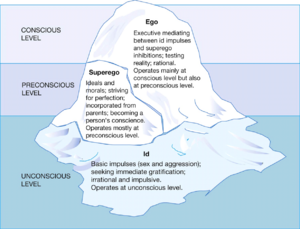Development of human psyche
From WikiLectures
Under construction / Forgotten
|
This article was marked by its author as Under construction, but the last edit is older than 30 days. If you want to edit this page, please try to contact its author first (you fill find him in the history). Watch the discussion as well. If the author will not continue in work, remove the template Last update: Saturday, 30 Jan 2021 at 12.12 pm. |
Definition of human psyche[edit | edit source]
- The place where thoughts and emotions come from
Development of the psyche according to Freud[edit | edit source]
- Human personality develops as a composite of early childhood experiences → how these experiences are consciously and unconsciously processed within human developmental stages
- According to Freud there are 5 Stages of psychosexual development, unresolved conflicts can shape the personality in these stages
- Oral (0-1,5yo): fixation on all things oral (if not satisfactory met, there is the likelihood of developing negative oral habits or behaviors);
- Anal (1,5-3yo): developing healthy toilet training habits:
- Phallic (3—5yo): development of healthy substitutes for the sexual attraction that boys and girls have towards a parent of the opposite gender;
- Latency (5-12yo): development of healthy dormant sexual feelings for the opposite sex;
- Genital (12-adulthood): all 4 previous stages are integrated into the mind, allowing for the onset of healthy sexual feelings and behaviors
Freud´s model of Superego, ID and Ego[edit | edit source]
- Superego: conscious level, where society and parental guidance are weighted against the ID
- ID: impulses and drives (unconscious: food, sex drive)
- Ego: Judgement and communication between superego and ID
Examples of disorders in early development of psyche[edit | edit source]
- Personality disorders:
- Personality disorders have a genetic component, but as many other mental disorders their origin in multifactorial (i.e. nature vs nurture)
- e.g. conduct disorder → antisocial personality disorder
- Dissociative identity disorder: due to abuse in early childhood, in the period where the personality is forming → a protective mechanism that leads to the splitting of the personality
- Reactive attachment disorder/disinhibited social engagement: disorders arising through neglect of the primary caregivers (i.e. mother/father)
Individual periods of life and important events[edit | edit source]
- Infancy
- Infants develop and their psychological functions increase
- social smile 2 months of age
- they develop object permanence (they realize that the world is steady and persists even if they don´t pay attention to it, i.e. they can close their eyes and know that the object will still be there)
- interaction with objects around them, categorizing them (part of development of the psyche)
- highly dependent on the relationship with the caregiver (mother)
- Childhood
- 2 until 12-13
- 2 years old speak around 200 words → communication, thought processes
- 4th year: most children can speak in adult-like sentences
- Empathy, emotional world, moral compass develops
- Adolescence
- 12-20
- setting up hypotheses, rational evaluations (not taking things for granted)
- control and direct their sex urges, first relationships
- lessening of their emotional dependence on their parents → develop a mature set of values and responsible self-direction
- Adults
- Midlife crisis: realize they cannot achieve everything and that time is limited
- Menopause in women
- in later ages: dependence on younger people
Links[edit | edit source]
- https://www.britannica.com/science/psychological-development/Adolescence
Related Articles[edit | edit source]
Bibliography[edit | edit source]
References[edit | edit source]

